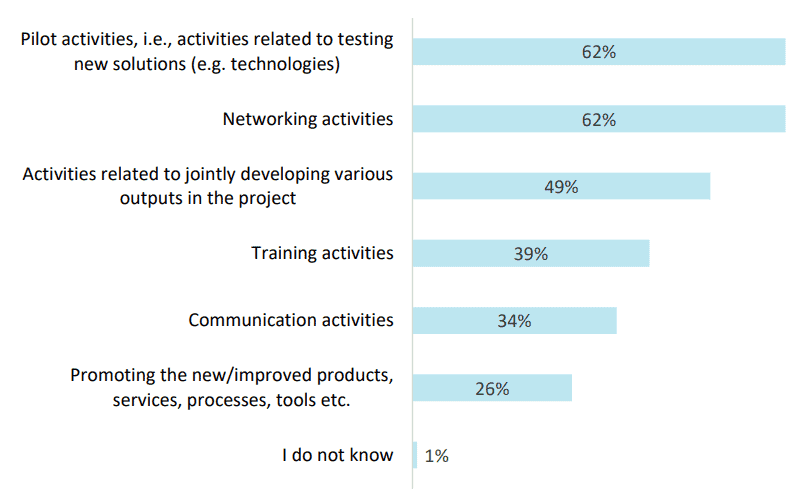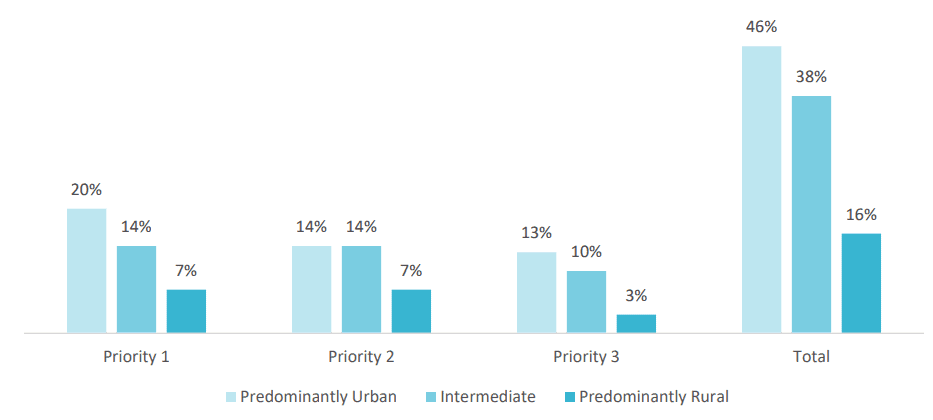
13 February 2023
The final evaluation of the 2014 – 2020 Programme supports the approaches taken in the new Programme.
Written by Eeva Rantama
Good partnerships, pilots and networking boost capacity building
The main aim of the Interreg Baltic Sea Region 2014-2020 Programme was to increase institutional capacities of authorities, NGOs, companies and other organisations to make the region more innovative, better accessible and sustainable. This was the assignment given to projects that received Programme funding under its thematic priorities on innovation, management of natural resources and sustainable transport. CIVITTA company had the task to find out whether this happened when carrying out the final evaluation of the Programme.
A survey among the project partners was carried out as part of the evaluation. Approximately 260 project partners took part in the survey. The majority of them saw the projects succeeding in the capacity-building task. In all the Programme topics projects generated knowledge and competence for their target groups, increased capacity to work in a transnational environment, made the use of human and technical resources more efficient as well as improved governance structures and organisational set-up.
The evaluation concluded that the most important factor for projects to succeed was the partnership. Partners’ expertise and experience in the specific topic were essential, but also partners’ connections to the target groups that the project wanted to influence. The project partners mentioned networking and pilot actions to test new solutions in real life as the most successful activities to support learning processes and institutional capacity building. These conclusions support the approach taken in the new Interreg Baltic Sea Region Programme in which every core project is expected to test new solutions in practice through pilots.
The figure below presents the different types of activities that were most useful for increasing institutional capacity.
Source: CIVITTA, Survey on the beneficiaries of Interreg Baltic Sea Region 2014–2020
It was not a surprise that the biggest challenge influencing the institutional capacity building processes in the projects was the COVID-19 related restrictions. Other factors highlighted by the project partners were the insufficient capacity of target groups to internalise changes or maintain results, as well as the difficulty to engage some target groups, like SMEs.
The recommendations from the evaluators for the new Interreg Baltic Sea Region Programme suggested among others that more focus should be placed on ensuring the practical usefulness of the project outputs and results for the target groups. In addition, evaluators recommended that the Programme should further promote the transfer and uptake of results from previous projects and programme periods in a given topic.
Human and technical resources in more efficient use in the region, but structural changes needed
One part of the evaluators’ assignment was to find out what the status of institutional capacities in the region is in relation to the thematic objectives of the Interreg Baltic Sea Region Programme 2014-2020. To this aim 68 experts from all Programme countries gave their opinion about the different dimensions of institutional capacity in their field of expertise. Similar surveys had been carried out also in 2014, 2018 and 2020, thus some developments in the region could be observed.
Source: Interreg Baltic Sea Region Programme 2014-20
The biggest positive changes that the experts observed were related to the Programme objectives of research and innovation infrastructure, clear waters and interoperability of transport modes. Within the innovation and transport fields, the improvements were visible in particular as better governance structures and organisational set-up. In addition, online tools and digitalisation had helped to use human and technical resources more efficiently. In the topic of clear waters, the experts acknowledged in particular the achieved capability of responsible organisations to work in a transnational environment.
No progress in comparison to 2014 was observed in the field of non-technological innovation. The experts saw the biggest challenge in attracting external private resources for non-technological innovations. Technological innovations were prioritised in public funding as well. In addition, sustainable support structures were missing in particular at the regional level.
Overall, the experts were satisfied with the state of institutional capacity in the region. COVID-19 pandemic had caused additional challenges. Further increase in capacities with the continuation of existing support mechanisms would be difficult, however. For further improvement, structural changes in existing systems and policies were needed. Furthermore, the evaluators pointed out that challenges differed between specific objectives and countries, therefore different measures or approaches needed to be applied.
The robustness of the method of assessing institutional capacities in the region based on the opinion of a limited number of experts could be questioned. Nevertheless, the exercise and the detailed observations per topic offer interesting food for thought for the Programme bodies and project developers.
Project partners mainly from urban areas
The evaluators investigated further the influence of the type of territory on projects. They classified the different territories in the Programme area into predominantly urban areas, intermediate regions and predominantly rural regions. The project partners were mainly concentrated in predominantly urban areas (46%), followed by intermediate ones (38%).
The figure below presents types of territories covered by the Programme (by location of partners).
Source: Interreg Baltic Sea Region data, CIVITTA processing
Project partners in the study perceived the involvement of organisations from economically weaker rural areas in projects as more difficult than it was for organisations from stronger, urban areas. Weaker administrative capacity and experience on project topics as well as limited networks were seen as hindrances to engaging partners from rural areas. The projects that successfully included partners from rural areas implemented pilot activities addressing specific needs and challenges on the local level (e.g. mobility and public services).
The evaluators saw a need for the Programme to more strongly support institutional capacity building in rural areas. In the new Programme, small projects, as a new type of project, enable easier access for less experienced organisations to transnational cooperation. In addition, the MA/JS expects that the focus of the new Programme on public authorities from the local and regional levels and on the implementation of pilots on the ground make the Programme more attractive also for partners from rural areas.
Platforms successful in influencing policy change
The project platforms were a new type of project in the 2014–2020 Programme to capitalise on the results and products of existing projects beyond Interreg Baltic Sea region. According to the evaluators, the main added value in bringing together projects from different funding sources (BONUS, Horizon etc.) was the sharing of knowledge and expertise. The outcomes of the project platforms, like policy recommendations, were based on a synthesis of results from different projects and thus had a broad knowledge base. The evaluation found that public authorities had an important role in project platforms. They were responsible for the elaboration of policy recommendations as well as organised discussions and networking with target groups and other stakeholders. The evaluation found all nine project platforms successful in influencing policy changes. For example, their recommendations were considered in new policy documents, like the Baltic Sea Action Plan of HELCOM or the European Commission Strategy on Adaption to Climate Change. The new Programme will again establish project platforms as soon as there is a sufficient number of advanced small and core projects to build thematic project clusters in the region.
Best results through a combination of online communication and meetings in person
As mentioned above, COVID-19-related restrictions stood out as the most important challenge affecting the capacity building process in the projects. The evaluation concluded that the shift to online cooperation had a notable negative impact on the development of relations among project partners as well as the development of networks with other projects, stakeholders, and target audiences. Some types of activities such as piloting, brainstorming or active thematic discussions, did not work in online mode. On the other hand, it was noted that online communication among partners allowed more flexibility in arranging project partners’ meetings or ad hoc discussions in smaller working groups. In addition, outreach via online events was much bigger, but the real engagement of target groups was harder in the online mode. In conclusion, the evaluation suggested that a balance between online and in-person meetings, activities and events should be kept in the projects in the future.
Final Programme Evaluation
The final evaluation of the Interreg Baltic Sea Region Programme 2014-2020 was carried out by CIVITTA during the period of April to December 2022. The Final Evaluation report is available here.





